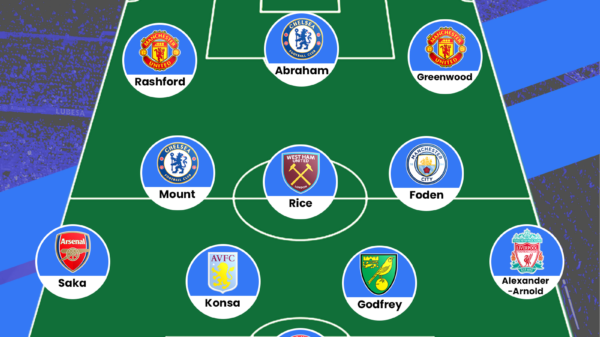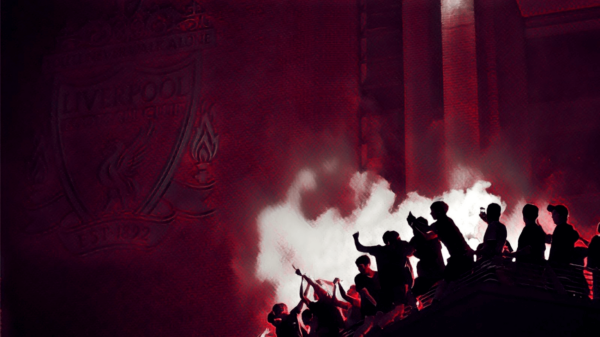“Men of lofty genius when they are doing the least work are most active.” Leonardo Da Vinci on genius
The playmaker. The number 10. The trequartista. Whatever you want to call that mischievous player who lurks behind the striker(s), these are the players that get my pulse racing. It is a particular brand of ‘number 10’ that usually gets my footballing juices flowing, usually the sort playmakers that are less ‘all-action’ and instead seem to effortlessly stroll through the game, yet somehow dictating the whole pace of the game at the same time. Incidentally, one of my favourite footballers ever is Juan Roman Riquelme, a player who lumbered so slowly around the pitch it almost appeared like you were watching a game in rewind. Yet, he was a true genius of the game with talent and skill in abundance. A bit closer to home (well, in Europe) I believed there was a player of a similar ilk, a player that completely mesmerised me every time I saw him play. Yes, he had his flaws, but to me Andrei Arshavin was (is?) a genius, if a slightly unorthodox one.
Unfortunately, I feel one of the saddest stories in modern football is that the Premier League or Arsenal never really got to see the true virtuoso that is Andrei Arshavin, apart from the opening ten months of his time in North London. Probably rightly so because of his lack of playing time and high wages, it has been announced that Arshavin has been released from Arsenal. I can now only lament on what a wasted talent we’ve all missed out on over the past 3 years.
The Zenith of His Career
It’s safe to say, that Andrei Arshavin was a late bloomer in regards to making a name for himself. In fact, Arshavin made his senior debut for his club side Zenith St. Petersburg against Braford City of all teams, in the now redundant Intertoto Cup. However, his real rise to prominence came in 2007, as he pulled the strings from his playmaker role for Zenith St. Petersburg’s surge towards the Russian Premier League, their first title winning season since the defunct Soviet Top League. 2008 saw Arshavin’s hometown club Zenith win the UEFA Cup, beating a spirited Rangers team in the final. It was during this UEFA Cup run that Arshavin charmed me with his footballing prowess. Thanks largely to me and my housemates not being able to afford Sky TV during my Uni years, ITV’s European football was our only refuge for in-house live football (dark times indeed), yet Arshavin’s Thursday night performances on ITV4 made it all worthwhile. He was a joy. That languid strut around the field; the non-chalant tricks; the audacious flicks and that ability to just suddenly come to life and sprint at the opposition, before utterly bamboozling the stricken defenders with his repertoire. Zenith scraped past Villarreal and Marseille, before Arshavin-inspired performances, alongside the free scoring Pavel Pogrebynak dismantled Bayer Leverkusen and Bayern Munich 4-2 and 5-1 over two legs. Arshavin would also pick up the Man of the Match award in the 2-0 final win over Rangers. The elegant Russian finished the season with 27 assists with 10 of these coming in the club’s run to UEFA Cup glory
His 2008 club campaign was to set the precedent for his outstanding performances in Euro 2008, a tournament which truly launched the Russian into the limelight as he emerged from the tournament in Austria/Switzerland as one of the tournament’s star players. Euro 2008 was the tournament in which the world was truly introduced to his genius. Many people even forget that he only played in 3 games in that competition, thanks to a 2 match ban for kicking out at Andorra’s Ildefons Lima in the 1-0 qualifying victory which secured Russia’s place at the Euros. Despite missing Russia’s first two games (a 4-1 defeat to eventual champions Spain and a 1-0 victory over the previous champions Greece) Arshavin made an immediate impact on his return to the team with a masterclass against Sweden. Playing off Roman Pavlyuchenko in a second striker role, Arshavin had the freedom to roam and scored the second goal in a 2-0 victory to secure Russia’s passage to the quarter-finals to take on a much fancied Dutch team. Holland had been electrifying in the group stage taking a maximum 9 points from a group containing Romania, France and Italy – many people had the Dutch penciled in as Champions after their incredible performance and 3-0 victory over Italy. Russia would not read the script and another Arshvain-inspired performance ensured Russia were in the semi-finals. Russia dominated the game, but thanks to a Van Nistelrooy equaliser the game went to extra-time. The ‘lazy’ Arshavin was nowhere to be seen, as he ran tirelessly as the Andrei Arshavin show kicked into full swing during extra time. Arshavin set up the crucial goal to make it 2-1 and scored Russia’s third to truly bury Holland.
Arshavin appeared to have adopted the footballing spirit of Total Football to destroy the forefathers of the intricate footballing philosophy. One of my favourite moments of Euro 2008 was Arshavin’s goal followed by his humorous ‘shrug of the shoulders-with -smiley-face celebration which displayed the fun side to his character that we have seen during his time in the Premier League (the Q&As on his own personal website were truly hilarious – the guy has a brilliant sense of humour and a great ‘quote machine’ for the media).
From Russia With Love
Supposedly, the world’s elite were all in for Arshavin following the Euros, but as Zenith clung onto Arshavin through the summer transfer window, they could do nothing to stop their talisman moving to Arsenal for £15m (still a club record signing) in January 2009. Arshavin was a star signing for Wenger at the time and he certainly started his Arsenal career playing like one. Arshavin was truly magical in his opening games for Arsenal and playing like the player the world had witnessed in Euro 2008 and over the past two seasons at Zenith. His first goal for Arsenal came at the Emirates Stadium, as he took on the Blackburn defence with a clever piece of trickery before scoring from a tight angle. His most memorable display was still to come.
On an April night, in one of the greatest games in Premier League history, Arsenal drew 4-4 at Liverpool – Arshavin scored all 4 in what has to go down as one of the greatest individual performances in modern Premier League times. Arshavin even seemed to find how good he was funny, as he ran away celebrating his fourth goal, holding up four fingers and seemingly laughing to himself. Despite only playing 12 games for Arsenal in the 2nd half of 2008/09 season he finished with 7 assists and 6 goals – effectively Arshavin had had a major part in ensuring that Arsenal remained in the treasured top 4. The first ten months of 2009 would be kind to Arshavin, but the end of the year would leave him sullen and well en route to his downfall.
Downward Spiral
For me, the last three years have been a total waste of a genuine footballing talent. It is quite hard to decipher who was truly to blame for the fall of Arshavin. Of course, a large portion of the blame has to be placed on the player himself as he was the one ultimately delivering such tepid performances; however, how much of the blame does Arsene Wenger claim? It was his management that led to his regression after all. Wenger had stated in the buildup to the 2009/10 season that Arshavin would be a key component in a new look Arsenal and that the Russian would be even better now that he knew “how English football works.” There were still glimpses of the superb, as Arshavin scored a 30 yard screamer at Old Trafford at the beginning of the 2009/10, but that was to prove to be a highlight of very few for Arshavin that season – in fact for about three years.
Arshavin’s form declined so much so that he firstly found himself a perennial substitute and by 2011 he was even struggling to get in the squad. The misery was made all the more worse when the Gooners fans turned against the Russian and jeered his every move (especially if his move was to step from the substitutes’ bench and out on to the pitch). The Russian’s play was at first seen as a sort of lethargic brilliance (a la Dimitar Berbatov), but now he was just seen as lazy and for modern football fans, the appearance of laziness translates to the fans as uninterested and lacking passion for the red shirt. It must be emphasised how much Arsenal fans adored Arshavin in his first 10 months or so at the club to show how far his star had plummeted. So where on Earth did it all go wrong for this once mercurial Russian?
I would start by saying that Arshavin’s reputation and it’s ascendancy in his home nation may have been a slight catalyst for the fall from grace. With Arshavin made national captain in 2009, he found himself leading Russia against Slovenia in a two-legged World Cup playoff game with the victor heading to the 2010 World Cup in South Africa. In a shock result, Russia were beaten via away goals and Arshavin would miss out on the opportunity to play at his first World Cup. Wenger noted that on his return from the Playoff games, Arshavin was clearly distraught and soon his form began to dip.
Although Wenger noted a regression in the morale and form of Arshavin, but was he partly to blame for the dip in the first place? Arshavin had excelled in Euro 2008 and at Zenith by playing in the free role off the main striker, usually Pavel Pogrebynak. The free role suited Arshavin as he could use his cunning football brain to exploit areas of weakness in the opposition and it also meant that he did not have to play any sort of defensive role, a part of his game that is virtually non-existent. On arriving at Arsenal, he occasionally found himself playing through the middle of the pitch, but generally he was lumbered on the left side of an attacking triumvirate featuring Fabregas and Nasri. With Fabregas dropping slightly deeper than most attacking midfielders, Arshavin had plenty of room to cut infield and run at and pick off defences. It is worth noting that all four of Arshavin’s goals at Anfield on that Tuesday night in April 2009 all came from Arshavin bursting through the middle at a stuttering Liverpool defence. It looked more and more likely that Arshavin was destined to become Arsenal’s maestro just behind the front line. It wasn’t to be though.
It was during the opening months of 2009/2010 that I saw Arshavin play in the flesh for the first time, as he captained Russia in a World Cup qualifier at the Millennium Stadium, the home of my home nation, Wales. He was a joy to watch and worth the ticket price alone as he dazzled the Welsh public with a Cruyff-like performance. He was popping up all over field and effortlessly waltzing elegantly through the Welsh defence. He was perfect. Yet the second time I was to see Arshavin play, in August 2011 as Arsenal took on my beloved Swnasea, he was a shadow of the player I witnessed had two years previous. Despite scoring the only goal that day (a freakish mistake from Michel Vorm and Angel Rangel gave him an empty net to fire into), he was slow, sluggish and ultimately uninterested in performing. I wondered what the hell had happened to him over those 2 years?
As 2009/10 progressed and Arshavin’s form worsened, Wenger perhaps did not help the situation by still persisting with the Russian in an uncomfortable left-sided role. The Russian’s cause was not helped further with Wenger seeming to attempt to make his role a more disciplined and defensive role rather than his preferred free role. It is fair enough that Wenger was thinking of the team as a whole, but unfortunately for Wenger it is rather difficult to set boundaries for such a individualistic player. Even when Fabregas left Arsenal to sign for boyhood club Barcelona, Wenger had seemingly lost faith in Arshavin and refused to deploy him in the slot left behind by Fabregas, despite the now vacant position behind almost tailor-made for Arshavin. Sadly, Arshavin would never really win Wenger’s faith back.
There was a brief glimpse of what could have been for Arshavin at Euro 2012, as the enigmatic Russian led Russia into the tournament as captain. Fans of the Premier League were expecting very little from a player that had put in minimal effort in the season leading up to the championships, but in the opening game of the tournament, Russia v Czech Republic, Arshavin was unrecognisable. He was brilliant. Why was he brilliant? Well Arshavin was giving the freedom to play freely between the lines of the Czech midfield and defence and thus he caused absolute havoc. A true masterclass was delivered and Europe stood up and took notice again, just like they had 4 years previous. Aside from a Cruyffian display of technical ability, Arshavin also showed a less familiar side to his game with positive closing down of players and some lung bursting runs past defenders, a sight that had been alien from his Premier League performances for a long time.
Unfortunately, this was merely a glimpse of the great man’s powers as Russia drew and lost the last two group games and crashed out of the tournament. Alongside the manager Dick Advocaat, Arshavin the skipper was made the fall guy again and he returned to his former footballing melancholy, accused of not caring whether the Russian team succeeded or not.
Arshavin is perhaps one of Wenger’s greatest examples of why he is so prudent in the transfer window. A luxury signing that appeased fans in the short term, but ultimately a signing that will sadly fall into the ‘Wenger’s flops’ category of signings along with Francis Jeffers, Pascal Cygan and the anonymous Park Chu-Young.
Following his release from Arsenal there has been some speculation that Arshavin could be made the best paid player in the world by joining Azerbaijani club Khazar Lankaran (now managed by John Toshack). Whether he heads to Azerbaijan remains to be seen, but the astronomical wages will not make up for the past three years and how a genius was wasted.
- Sorry, Chris: An Apology to Coleman - June 16, 2015
- 20 years on: Colombia’s original golden generation & subsequent Escobar tragedy - July 3, 2014
- World Cup Golden Boot: A Bony-fide Goalscorer - June 11, 2014



























































